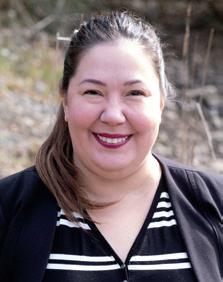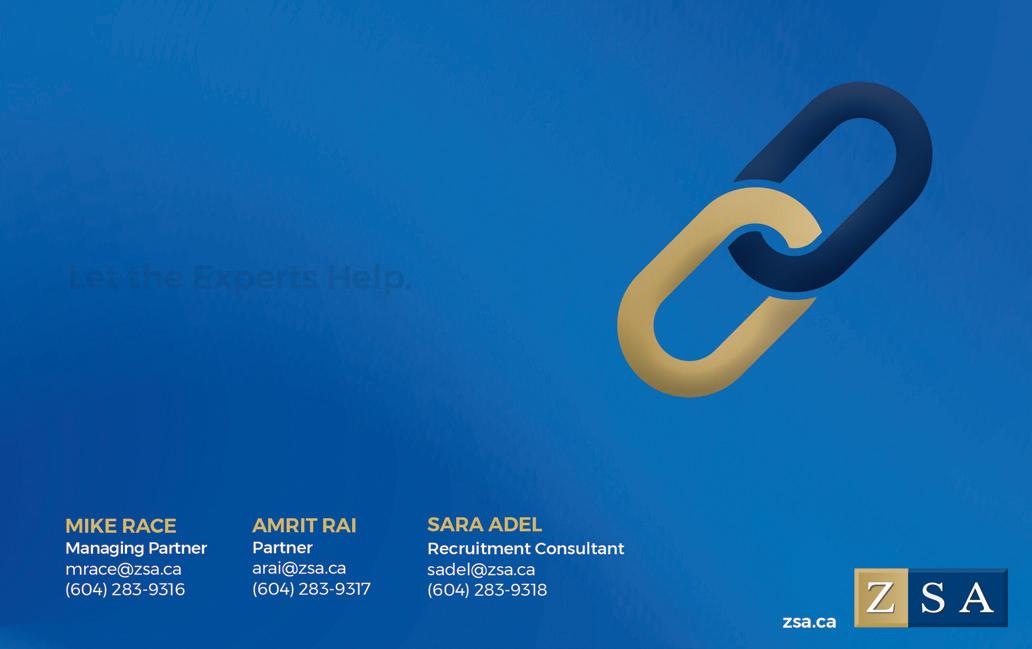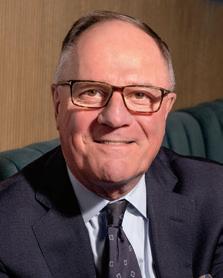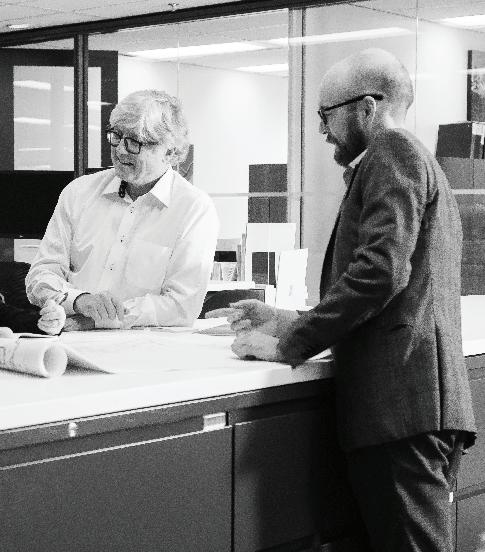Regulation & the Profession



JUNE 2023
Volume 35 | Number 3
From the President
4 Maintaining the Independence of the Legal Profession

Aleem Bharmal, KC
Executive Director
5 Be Part of Something Bigger
Kerry L. Simmons, KC
Zach M. Romano, Saul Joseph and Judith Hoffman
Guest Column
16 An Interview with The Honourable Chief Justice Robert Bauman
Brandon Hastings
PracticeTalk
24 Legal Regulation at the Crossroads
David J. Bilinsky
Guest Column
26 Mentorship Matters
Jessica Forman, Sarah Ewart and Harmit Sarai
Nothing Official
29 Resistance is Futile Slartibartfast 4.2
Isabel Jackson, Committee Chair Editorial Committee
Tonie Beharrell Eryn Jackson Demola Okeowo Lily Zhang
Brandon Hastings Judith Janzen Josephine Wong
Deborah Carfrae, BarTalk Editor
BarTalk is produced on the traditional and unceded territories of the Coast Salish peoples, including the Musqueam, Squamish, and Tsleil-Waututh Nations.
BarTalk is published six times per year by the Canadian Bar Association, B.C. Branch (CBABC) and is available at cbabc.org/bartalk. This publication is intended for information purposes only and is not legal advice.
CBABC supports more than 7,600 members in British Columbia. We connect our members to the people, knowledge, and skills they need to successfully practice.
BarTalk enquiries, suggestions, and letters to the editor: Canadian Bar Association, B.C. Branch 10th Floor, 845 Cambie Street Vancouver, B.C. V6B 5T3
Membership Enquiries membership@cbabc.org
Contact Updates data@cbabc.org
t: 604.687.3404
tf: 888.687.3404
e: bartalk@cbabc.org
Advertising ads@cbabc.org
© Copyright 2023 The Canadian Bar Association, B.C. Branch
BarTalk Publication Sales Agreement #40741008
As many of you are aware, the BC government released an Intentions Paper on September 14, 2022, entitled “Legal Professions Regulatory Modernization” that provided notice of its intention to develop legislation that would regulate all legal service providers under a single statute and by a single regulator.

In response, CBABC held a series of roundtables this past fall gathering the feedback of our members and, working with our relevant Sections and Committees, provided a written submission to the BC government on November 18, 2022. One of our key points in response to the Intentions Paper was the critical importance of maintaining the independence of the legal profession as the government moves forward with its initiative.
“Independence of the profession,” just like “rule of law,” has various definitions, some broader and more wide-ranging than others, but, at its core, it entails adequately safeguarding the profession from political state interference. The oft quoted passage in support of this essential principle, fundamental to a free and democratic society governed by the rule of law, is from Justice Estey in AG Can v Law Society of BC, [1982] 2 SCR 307 at 335-336, 1982 CanLII 29, which we cited in our submission (bit.ly/CBABC_Roundtables).
As we further pointed out in our submission, this core principle seems to be under attack, to varying degrees, around the world, and B.C. is, by no means, immune. Very recently, we felt compelled to put out two public
statements regarding what appears to be an encroachment upon or, at the very least, a misunderstanding of, the independence and special nature of our profession, as well as that of the judiciary, the independence of both of which are intertwined.

One of the recent statements we released expressed concern about the current public debate about bail decisions that, in our view, unfairly blamed judges and prosecutors for releasing repeat offenders back in the community. We are by no means arguing that judges or prosecutors are infallible, but there appeared to be a lack of appreciation, in the public discourse, about what judges’ and prosecutors’ critical roles truly entail.
We also sensed some degree of political opportunism in trying to shift blame and reduce a complex societal problem to a simple solution — just create some more rules or policies telling judges and prosecutors how to do a better job of keeping repeat offenders behind bars and things will be better.
There didn’t appear to be an understanding, in these public discussions, about the requirement of judges to apply the law as it is written and as it has been interpreted by our highest court. There didn’t appear to be consideration of how critical it is that judges and prosecutors remain independent of political influence and the reasons for that being so essential in a free
and democratic society. Neither did many public commentators seem to realize or at least mention that public safety is already an important factor to be considered by judges and prosecutors.
In the subsequent media interest and few appearances that followed our public statement, we received some feedback that, as an organization, we lacked sufficient sympathy regarding the public’s valid concerns. We, in turn, are concerned that much of that public worry has been unfairly whipped up by politicians and media without a proper explanation of what the critical roles at play are and what is at stake when you unduly interfere with the independence of them.
Again, we are not saying that our judiciary and prosecutorial services must always be beyond criticism in whatever decisions they make, but to maintain trust in our judicial system, all must have confidence that their decisions are made fairly and impartially, and their independence is fundamental to that trust, something about which the CBABC will never hesitate to speak out.
Aleem Bharmal, KC president@cbabc.org

This issue features a myriad of updates and views about the regulation of lawyers. The BC government wants to see a single regulator and single statute for lawyers, notaries, paralegals, and other legal professionals. Both the Law Society and Society of Notaries Public wish to modernize, particularly in light of the Cayton Report (bit.ly/bt0222p5-1) recommendations. With these once-in-ageneration changes, the need for and importance of the Canadian Bar Association increases again.
Your membership in CBABC, now over 7,700 strong, enables BC lawyers to be heard as a collective. And the power of that collective allows lawyers to make informed and timely representations to the regulator and to government. CBABC members practice at the forefront of our legal and justice systems, providing services to British Columbians in every area of law. We witness and share with them personal and business challenges and crises. We have unique insight into the impact that laws, policies and those systems have on people. This issue updates you on CBABC’s advocacy on regulation and also the many other areas where we have seen advocacy wins and are making timely recommendations for reform.
There is a further distinction between the role of the regulator and the role of the association. Each needs their own lane. Think of a roadway with lanes of cars. Sometimes they run parallel, sometimes they merge and sometimes they cross. The same should be true
for the regulator and CBABC. We have distinct purposes. LSBC regulates legal professionals and protects the public interest. It should provide support services to the professionals only to the extent necessary for them to meet their professional obligations to the satisfaction of the regulator. It cannot be all things to those professionals. To do so would put the regulator in a conflict with its obligations to the public and to the professionals regulated.
CBABC, as the professional association, provides support to lawyers as well as representation of lawyers. Offering opportunities to be brilliant, be heard, be connected and be well balanced is what CBABC is all about. Professional development, consultation roundtables, events to foster collegiality, and supportive resources are what members expect and benefit from at CBABC.
This spring, we launched two new programs to support members. CBABC is committed to creating opportunities for the advancement of Indigenous lawyers. One way we do this is by supporting more Indigenous lawyers to access the benefits of a CBABC membership through the new Indigenous Lawyers Waivers of Dues Program (bit.ly/bt0623ks1). This program helps to advance reconciliation and create an environment in CBABC where Indigenous lawyers feel welcome and supported. Those who may face financial barriers to
CBABC membership can apply to the program.
Are you looking for quick advice from an experienced lawyer? Practice Coaches (bit.ly/bt0623ks2) connects members to experienced lawyers in their field to discuss a specific issue or file. Over 40 lawyers across 16 practice areas are now available to answer your questions. This program is a great opportunity for new lawyers or those new to their field, or those in solo practice.
With our extensive Section and Committee network, CBABC is the place where government, the courts, the regulator, or other agencies can consult with groups of lawyers on anything. Want to talk to real property lawyers about effective modern transfer of funds in conveyancing? CBABC can connect you to that group. Collecting the views of early career starters on what they need from an articling principal? We’ve got you. Think you know about access to justice? Our front-line lawyers have a few things to say.
Now, more than ever, membership in CBABC matters. Come be part of something bigger and ensure your voice is heard. You won’t regret it.
Kerry L. Simmons, KC ksimmons@cbabc.org
In March 2022, the Ministry of Attorney General of British Columbia announced a project to modernize the regulatory framework for legal professionals in B.C., including lawyers, notaries and a newly-created category of professionals called licensed paralegals. As part of this project, the Ministry is proposing to:
bring all regulated legal professions under a single statute with a single regulator;
establish a clear mandate for the regulator that clarifies its duty to promote the public interest; and
establish clear scopes of practice for each regulated profession with procedures to allow for expanded scopes as needed.
A key intention underlying this project is to improve the public’s access to legal services. As noted in the Ministry’s September 2022 intentions paper, access to legal services is in part a regulatory issue, because rules around who is allowed to provide what services have an impact on the availability and cost of those services. To be clear, the Ministry does not expect that these proposed reforms will, on their own, “solve” the access to justice crisis. Access to justice, as a whole, includes a number of different facets (including access to courts, access to legal advice, access to timely
proceedings and decisions, and support for unrepresented litigants), many of which have no direct tie to regulation. However, modifying the regulatory framework underpinning the provision of services is one of many tools we can use as we continue to seek solutions to the broader crisis.
The concept of a single regulator is not new. The Law Society and Notaries Society have in the past explored the possibility of an amalgamation, on the basis that a single regulator model is better positioned to:
collect data on the provision of legal services across B.C., and regulate in a manner that seeks to address any identified gaps;
align standards between legal professionals providing similar or overlapping services.
The concept of alternative legal service providers is also not new. Many jurisdictions across North America are experimenting with the establishment and regulation of additional categories of skilled legal professionals as a means of offering more options for the public. The amendments contemplated by the Ministry will ensure the regulator is equipped to effectively regulate not only lawyers, notaries and licensed paralegals, but will also ensure the regulator has the flexibility it will need to respond to the continued (and rapid) evolution of the legal services marketplace.
The Ministry’s intentions paper, published in September 2022, was intended as a vehicle for feedback on its contemplated reforms, and we wish to thank everyone who took the time to provide their submissions. Though change of this magnitude is often accompanied by concerns, it also opens the door for new and exciting opportunities. The input we received, and continue to receive, from regulators, associations, individual legal professionals, Indigenous partners, non-profit organizations, members of the public and others, are helping to shape a vision for a renewed, flexible and modernized approach to the regulation of legal services in our province.
enable the public to better understand their options when looking for help with a legal problem or issue; and
A key intention underlying this project is to improve the public’s access to legal services.ELIZABETH KOLLIAS
Paralegals are one of the most viable and valuable resource for supporting improved public access to justice along with a more lucrative client retention and billing scenario for lawyers and law firms alike.
The public doesn’t yet understand the role of a paralegal and, right now, neither do a lot of legal professionals. That’s OK, everyone’s busy. Advocacy and clarity of the evolving role of paralegals hasn’t fully taken flight, yet. So let’s buckle in and get the wheels up.
A paralegal is a non-lawyer who is a trained professional, working under the supervision of a lawyer. That’s straight out of the Code of Professional Conduct for B.C. These professionals have the education, training and knowledge necessary to take on specifically delegated legal work ordinarily performed by a lawyer (charging a lawyer’s rate).

Enter the British Columbia Paralegal Association and me, its President, Elizabeth Kollias. Our position is that paralegals play a key role in proving affordable alternatives to the public in accessing legal services. And we provide that without any reduction in quality of service rendered because our members are trained and skilled legal professionals. Since comic book films are all the rage, right now, allow me to draw a comparison. Paralegals are not Batman. But paralegals CAN BE effective members of the Justice League. We are trained, we are experienced, and we are good communicators.
We will become an effective force for heightening public confidence in the legal profession, while giving the public comfort by reducing clients’ bills. We’re The Atom. I was going to say Green Lantern, but thanks for nothing, Ryan Reynolds.
Paralegals work in all practice areas. Our ranks reflect a culturally diverse workforce. These professionals employ sensitive and insightful communication to reach out to clients who, unassisted, might be inclined to “wing it” in drafting and execution, or self-represent in relatively minor conflicts.
The absence of true access to justice has become the elephant in the room among the public. Faced with a legal issue — even a simple one — too many citizens have become inclined to say, “I just can’t afford a lawyer.” Some of these same citizens eschew the idea of going into “a big fancy law firm” because they’re convinced that they’ll be met by a bank of high-billing, condescending faces who will use words like “eschew”. Paralegals are perfectly positioned to bridge that gap. Effectively engaged and marketed, paralegals will be a vital element in aiding the expansion of public access to justice as well as demystifying the administration of that justice.
“Can’t a legal administrative assistant do the same as a paralegal?” No more than a dental office administrator (essential) can scale your teeth. Teeth scaling is the work of an educated and trained hygienist (also essential, but loses track of appointments). Legal administrative assistants perform supervised non-billable duties, often focused on scheduling and/or clerical tasks. Paralegals, on the other hand, perform billable work. We interview clients and witnesses, collect information, expertly prepare draft pleadings, court forms and agreements, engage in legal research and generate legal memos. Paralegals also engage in project management through the creation of work plans and budgets.
Any law firm of any size should be looking now to integrate paralegals into their practices. With our skillset, we offer the opportunity to attract and retain more clients, providing a higher level of service at a lowered cost. The engagement and deployment of “designated paralegals” to assume some of a lawyer’s traditional work with safeguards in place to cover liability and supervision already exists. Supported by the Law Society of B.C. and the Government of B.C., the landscape is now shifting to allow for the training and certification of “licensed paralegals” whose presence promises to change the game for the better for both the public and the legal profession.
CBABC is proud to be a driving force for our members in matters of law reform, policy and regulatory changes to the legal profession.
Our members’ input and influence has led to a flurry of consultations and advocacy wins this spring.
We are pleased to see Bill 27, Money Judgement Enforcement Act (bit.ly/bt0623a6) brought forward, following a decade of advocacy (bit.ly/bt0623a4). Our members who work for a successful outcome for their clients, have shared their frustration in not being able to collect judgements. This legislation offers an improved process.
Following our response (bit.ly/bt0623a5) to the Ministry of Attorney General’s Intentions Paper in November, we continue to push for the rule of law through the separation of the legal profession from government. An independent legal profession enables lawyers to contribute to law reform, increases confidence in the justice system and allows the judiciary to remain impartial.
In March, the Law Society asked the government to allow for the licensing of paralegals. CBABC is preparing submissions on the scope of practice for paralegals and notaries. Thank you to the Wills & Trusts lawyers for providing their views at the consultation.
Additionally, CBABC is deeply disappointed to see the BC government move forward with Bill 5, Public Service Labour Relations Amendment Act, 2023. In addition to the clear lack of understanding around public sector lawyers’ unique role, we remain very concerned about government actions that force any employee group to be part of a union not of their choosing.
We continue to support our members within the BC Government Lawyers Association as they respond to these developments.
CBABC commends the government on launching the new cross-ministry Indigenous Justice Secretariat and congratulates the newly appointed Assistant Deputy Minister, Colleen Spier, KC who will lead this initiative.
This demonstrates further funding for the BC First Nations and Métis Justice Strategies, which we long advocated for through On Matters of Indigenous Justice ( bit.ly/bt0623a1 ), and Agenda for Justice 2021 (bit.ly/bt0623a2).
We look forward to engaging with the government and continuing to push for advancement of Indigenous justice matters.
Several CBABC recommendations (bit.ly/bt0623a3) on modernizing the Family Law Act were reflected in Bill 17, the Family Law Amendment Act, 2023 (bit.ly/bt0623a6). These included: abolishing the presumption of transfer between spouses, providing special treatment to companion animals, and other provisions regarding pets’ care post-separation.
In anticipation of the government’s announcement of the next phase of reviewing the Family Law Act, our members are preparing submissions on the processes for judicial case conferences and section 211 reports. Our consultation to date has included ThoughtExchanges to gather members’ insights, as well as a series of wellattended roundtables with lawyers, psychologists, counsellors, social workers and judges on reducing costs and delay, and improving reporting consistency.

Jody Wilson-Raybould’s most recent book, True Reconciliation , opens with recounting the one question that she has been asked by Canadians more than any other: What can I do to advance true reconciliation in Canada? Reconciliation is a collective effort; as such, this is an important question for all Canadians to ask themselves. As lawyers, we have a unique responsibility to recognize and contribute to reconciling the intergenerational harms of colonialization experienced by Indigenous peoples given the roles the legal system and profession played in the implementation and enforcement of laws and policies in Canada.
One way of advancing reconciliation is for lawyers to sit down together and commit to the process of developing a Reconciliation Response Plan for their firms. It involves re-envisioning your firm’s goals and vision through the Truth and Reconciliation Commission’s Calls to Action (bit.ly/ bt1021fr-1) and committing to take steps to integrate reconciliation into a firm’s objectives. Firms can advance reconciliation in a number of areas, including cultural education for all members and staff, recruitment and retention of Indigenous counsel and staff, support for Indigenous probono initiatives and supporting Indigenous businesses through contracting opportunities.
There is much work to be done by the legal profession in B.C. to rise to the Calls to Action and more firms need to consider how to put into place a thoughtful and sustained plan to advance reconciliation. In 2022, the CBABC surveyed 15 large and
medium size firms (above 20 lawyers) in British Columbia. Two of these firms had completed Reconciliation Response Plans, four were in the process of developing one and six intended to develop one but had not yet started. Firms have informally expressed hesitancy to grapple with reconciliation without adequate knowledge and experience; however, we recommend that all firms undertake concrete steps to advance reconciliation and note that there are resources available to help guide this process:
1. CBA has prepared a toolkit (bit.ly/ bt0623im1-2) for firms wishing to begin the process to develop a Reconciliation Response Plan. It offers useful templates and examples and provides links to important resources.
2. CBABC has prepared a template Reconciliation Response Plan for firms and has compiled several helpful resources, including an on-demand webinar with J. Berry Hykin a partner at Woodward & Company and Zach Romano a partner at Fasken who speak to their firm’s experiences in developing a Reconciliation Response Plan.1
As you move forward with your firm’s Reconciliation Response Plan, there are some best practices to keep in mind:
Take time to ensure your team is starting from the same place. Read the Truth and Reconciliation
Commission Report2 and the Murdered and Missing Indigenous Women and Girls Report.3
Reconciliation is heavy work. Bring your colleagues with you and support them along the way.
Reconciliation involves difficult discussions; create a safe space to have them.

Be realistic with the goals and actions that you set; anticipate the practical application.
Hire an external third-party advisor to provide feedback and guidance.
Make space for Indigenous colleagues who volunteer to participate, but don’t make Indigenous colleagues do all the emotional labour.
As lawyers in British Columbia, reconciliation is our collective responsibility. We urge you to do your part to take up the Calls to Action and advance tangible and measurable steps toward reconciliation through the development of a Reconciliation Response Plan at your firm.
1 bit.ly/bt0623im1-3
2 bit.ly/bt0623im1-4
3 bit.ly/bt0623im1-5
Zach is a Métis lawyer and partner at Fasken Martineau DuMoulin LLP. Saul is a partner at Clark Wilson and member of Squamish First Nation. Judith is General Counsel with the Department of Justice with a litigation practice engaging the Crown’s relationship with Indigenous peoples.

Indigenous peoples have been at the forefront of advocating, educating and building alliances to rebuild, reclaim, reestablish and share their Indigenous orders and ways. Organizations, institutes, justice system stakeholders and others, are taking steps to promote inclusivity and respect, recognizing the implicit impact systems have had and continue to have on Indigenous peoples.
On September 23, 2022, the Law Society of BC’s Benchers unanimously approved the Indigenous Framework Report, prepared by the Truth and Reconciliation Advisory Committee. The report endorses principles that guide the Law Society in its application of the Legal Profession Act (Act), the Law Society Rules (Rules), and the Code of Professional Conduct for B.C. (Code).
The principles within the Indigenous Framework (Framework) are based on the Law Society’s Strategic Plan, the Truth and Reconciliation Action Plan, the United Nations Declaration on the Rights of Indigenous Peoples, the Truth and Reconciliation Calls to Action and the BC First Nations Justice Strategy. The Framework weaves together numerous concepts integral to the recognition and advancement of Indigenous peoples and issues.
The Framework does not create new obligations but instead brings together the principles already endorsed by the Law Society. It presents them in a cohesive manner that sets out the prominence of the principles and their logic.
Principle 1 adheres to the saying “Nothing about us without us,” and commits the Law Society to increasing Indigenous representation at all levels throughout the Law Society, including governance, committees, tribunals, employment and membership. It also recognizes the importance of the Law Society’s engagement with, and responsiveness to, issues as raised by Indigenous peoples, organizations and agencies.
Principle 2 acknowledges the unique nature of Indigenous peoples within Canadian Society. In step with this principle, the benchers recently unanimously approved amendments to the oath of office to reflect the Constitution’s recognition and affirmation of the Aboriginal and treaty rights of First Nations, Inuit and Métis.
Principle 3 acknowledges that Indigenous cultures, societies, traditions, governance systems and laws continue to exist, and holds space for all lawyers to learn about Indigenous laws and their possible use in the common law and with the Law Society’s own regular processes.
Principle 4 regards Indigenous individuals as equal to all other people, defeating the concepts of colonial superiority and Indigenous inferiority, addresses the right to non-discrimination, and appreciates additional supports are often necessary to create equity.
Principle 5 respects the distinctiveness amongst Indigenous peoples, individuals and territories, and encourages the accommodation of their distinct interests in light of the Act, the Code, policies, procedures and practices.
Principle 6 understands that credibility requires follow-through on its commitments, that its commitments are ongoing, and assures the Law Society will be accountable for publicizing its progress, and is compelled to review, evaluate and renew the Framework obligations enduringly.
Colonial legal systems have done significant and often irreparable harm to Indigenous peoples. History must be studied in earnest search of Indigenous perspectives, and with humility, in order to see how the harm was created.
The Framework contextualizes the confluence of laws, policies, practices and procedures that have impacted Indigenous peoples, and embraces the principles within to ensure the wrongs never repeat. Only by stopping the creation of harm can we truly support healing.
linkedin.com/in/katrinaharry
@KatrinaHarry3

For litigators seeking guidance on navigating their client’s estate disputes, this newly released book provides comprehensive coverage of both procedural and substantive issues commonly encountered in estate litigation. These issues include disputes over the validity of wills and actions against fiduciaries.
The guide offers concise discussions of substantive law that can provide valuable insights on managing clients, developing a litigation strategy, and preparing for evidentiary issues. In addition, the guide provides step-by-step guidance on procedures, and includes over 40 sample forms and precedents to help with the efficient preparation of cases.
For those considering resolving their client’s dispute through mediation or trial, the guide provides information on how to apply the best method and navigate the appropriate procedures governing the case. The guide also provides quick access to leading cases on substantive issues to help with arguing the case with confidence.
CLEBC would like to acknowledge all the contributors who made this book possible. To purchase a copy of this valuable resource and be fully equipped to litigate clients’ estate disputes, visit: cle.bc.ca/edbc

The British Columbia government has proposed that one entity should regulate lawyers, notaries and paralegals. The stated rationale is that this will lead to legal services being more accessible to the public.
The Law Society, like every group and individual involved in the justice system, considers access to justice a priority. There can be no doubt that many members of the public in B.C. simply do not have access to legal services. According to a 2020 Law Society survey, around 60% of British Columbians facing legal issues do not receive legal advice from anyone, which is alarming and speaks to the lack of an accessible justice system. No matter how strong, how impartial, how fair a legal system is, if the majority of people can’t access it, it is flawed.
The question is, therefore, can a single legal regulator address this problem? I would say that it is one potential tool. There are others: a properly funded legal aid system, the Law Society Innovation Sandbox, and elevated use of clinics like the Rise Women’s Legal Centre and the Indigenous Justice Centres. Properly conceived and organized, the single legal regulator could be one further instrument to increase access to justice. It can do this by providing an alternative, hopefully at a lower cost, to seeking legal advice
from lawyers. A single legal regulator would be in a position to ensure that the legal needs of the public can be provided by ensuring all legal professionals are licensed, competent, ethical and held accountable in a consistent manner.
A key component of this proposal is a flexible, competency-based approach to licensing all legal professionals, including lawyers, notaries and paralegals. While lawyers, notaries and paralegals may have different areas of practice, they would all be subject to the same high standards of competence, integrity and professional conduct. The Law Society supports a model where the regulator has the flexibility to ensure that every legal
of flexibility and could unnecessarily restrict the ability of trained professionals to offer appropriate legal services to the public.
Any proposed regulatory scheme must ensure the independence of the legal profession. While the Law Society supports the single legal regulator proposal in principle, the regulator and its board must remain truly independent. By the very nature of their work, legal professionals will inevitably find themselves representing clients whose interests diverge from those of the state. Those professionals must know that the body that regulates them is also independent of government influence.
Further, the board of the regulator must reflect the diversity of our population. There are currently more than 14,000 lawyers in B.C. There are fewer than 500 notaries, and so far, no licensed paralegals. Given their different roles, and the fact that by far the majority of current legal professionals are lawyers, the board should continue to be made up of a majority of lawyers. The elected model has served us well in the past and should continue to do so. Finally, any new legislation must enable the regulator, not the government, to maintain its broad, independent authority to regulate the competence and integrity of all legal service providers in B.C.
professional is competent in their area of practice. It does not favour a legislated scope of practice, as it would not offer the required degree

No matter how strong, how impartial, how fair a legal system is, if the majority of people can’t access it, it is flawed.
As a professional association, it is the mandate of the BC Notaries Association (BCNA) to Advocate, Educate, Promote and Support Notaries throughout British Columbia. We recognize the importance of aligning our efforts to the broader public interest, in order to retain the trusted relationship that BC Notaries have with their communities and clients.
Practising BC Notaries are legal professionals currently regulated by the Society of Notaries Public of BC. Graduation from the Simon Fraser University Masters in Applied Legal Studies program, a period of practical training and examinations, along with annual continuing education requirements, ensures that BC Notaries are competent in the areas of non-contentious law in which they are regulated and insured to practice.
Following years of advocating for change to the Notaries Act, the BCNA is supportive of the legal professions’ modernization undertaking, to align legal service providers under new legislation with a single regulator. Through an ongoing dialogue with government, we are optimistic that the Ministry of Attorney General recognizes that BC Notaries are well positioned to improve access to a variety of noncontentious legal services throughout British Columbia.
The BCNA is advocating to ensure that new legislation will expand the scope of practice for BC Notaries in areas congruent to their current practice rights, in order to ensure British Columbians have broader access to the provision of qualified non-contentious legal services in the following areas; the ability to provide advice to prepare testamentary trusts and life estates, the ability to provide advice to prepare and file probate documents in the court’s registry, and the ability to provide advice to incorporate and maintain records of companies in B.C.
BC Notaries can contribute to improving access to justice for British Columbians by providing access to legal services to citizens
Notaries practice in dense urban environments where there is high demand for legal services, and others practise in rural or remote communities where legal service providers are underrepresented. Additionally, many provide services in foreign languages, making BC Notaries a convenient and accessible option for those seeking noncontentious legal services.
Throughout this process, the Ministry of Attorney General has committed to retain the unique role of BC Notaries in new legislation, and the BCNA will continue to provide our perspective to government on the structure of a new regulatory Board. We are hopeful that legislation will be clear and concise, in order to avoid the potential for regulatory misinterpretation of legislative intent.
throughout the province. Getting the help of a legal professional, as opposed to using DIY internet templates can prevent problems down the road, which provides peace of mind, and may avoid the potential for future conflict. Many BC
The Legal Professions Regulatory Modernization initiative has provided opportunity for an open dialogue in the province on the future of legislation and regulation of the legal professions. The BC Notaries Association appreciates the engagement we have had with the CBABC and the BC Paralegal Association, as we work together with the Ministry of Attorney General to ensure that future legislation and regulation is in the best interests of British Columbians, while providing the public with increased access to professional legal services.

BCNA is advocating to ensure that new legislation will expand the scope of practice for BC Notaries.
CBABC members enjoy exclusive access to meetings and events in practice areas ranging from Administrative Law to Wills & Trusts, and interest groups like Young Lawyers and Public Sector Lawyers.
With 95% of meetings held virtually, get your CPD when and where you want it. Enjoy connecting with colleagues in-person? Section members regularly get together for socials and events.
Activities are organized by dedicated volunteers. Being a Section Executive can build your profile, expand your network and connect you to the latest practice developments.
This year, 66 Sections hosted over 200 meetings and socials. Here are some of the highlights:

Celebrating the benefits of hybrid meetings, the Wills & Trusts–Vancouver Section hosted a case comment led by Doe Kyung Lee, Fasken, on Simpson v Zaste, 2022 BCCA 208. Members also heard from Roger Lee, DLA Piper,
Mark Weintraub, Clark Wilson LLP and Tara Britnell, Hamilton Duncan, about how to manage complex estate litigations and how to build your toolkit. This meeting brought together over 100 online attendees and 33 in-person to engage with speakers and gather key takeaways.
The Aboriginal Law & Natural Resources Law Sections hosted a much-anticipated presentation from Maegan Giltrow, KC, Partner at Ratcliffe LLP and co-counsel on the 160-day trial, Vahey V British Columbia. Members were given an overview on the case starting points, key issues and the implementation agreement for this landmark decision.
Worth the wait! New lawyers enjoyed a sneak peek at a day in the life of a Supreme Court Master with the return of our sell-out Master Shadowing program. Now offered in Kelowna, Victoria and Vancouver, participants attend an informal dinner with the Master followed by a full day of learning the do’s and don’ts of Chambers practice.
Get all the latest Programs and Events at cbabc.org/Events
To celebrate National Indigenous Peoples Day, the CBABC Aboriginal Lawyers Forum holds an online auction raising funds for the Warrior Project. This year’s auction runs from June 16-24.

The Warrior Project funds articling positions for Indigenous students and is sustained by the success of the online auction and generous donors.
Don’t miss out! Donate an item, bid on an item, support your community, and share the auction with your friends and colleagues. Visit cbabc.org/warriorproject
In April, the CBABC Women Lawyers Forum held their biennial awards gala at the Fairmont Waterfront, bringing together members who strive towards empowering women lawyers and honouring three brilliant women with distinguished awards. We were honoured to host the Honourable Niki Sharma, KC, Attorney General of British Columbia, as our keynote speaker.
The WLF Award of Excellence was given to Myrna McCallum, a passionate proponent of educating professionals on Indigenous inter-generational trauma, risks of vicarious trauma for lawyers and trauma-informed lawyering.
The Debra Van Ginkel, QC Mentoring Award was presented to Cheryl D’Sa, who has given her expertise to those new to the profession through the University of British Columbia, Federation of Asian Canadian Lawyers Ladies Social and the Women Lawyers Forum.
Finally, we presented the new Rising Star Award to Julia Lockhart Lockhart for her exceptional work and achievements in under 10 years of call.
The gala was a huge success and a welcome change, providing connection and community after such a long hiatus.
By Sarah McCalla (she/her), CBABC SOGIC Co-Chair

We celebrate Pride to recognize and honour the many people who have worked and are working tirelessly, and often at great personal expense, to strengthen our 2SLGBTQ+ community and to claim the rights and freedoms that we were historically denied. We also celebrate Pride to recognize that the work is not done. Our community, and our trans community in particular, is increasingly facing barriers, violence, exclusion and hate (see e.g. your favourite news source or the Report of the Inquiry into hate in the COVID-19 pandemic — bit.ly/bt0623sogic1). During Pride, we come together and collectively raise our voices against discrimination in its many forms. We hope you will join us!
This year, SOGIC will be participating in the Vancouver Pride Parade on August 6. We also plan to participate in the Victoria Pride Parade on July 9, and in the Kamloops Pride Parade on August 27. More information on how to join us, and Pride-related resources, will be circulated closer to those dates.
You can also celebrate Pride by taking opportunities to make your practice more inclusive, including by using gender-inclusive language (Practice Resource on Inclusive Language — bit.ly/bt0623sogic2) and sharing your pronouns in and out of court (Pronouns in Court Toolkit — bit.ly/bt0623sogic3).

The last 15 years of my career have been beyond anything I ever expected. I always wanted to be a member of the Court of Appeal and was lucky enough to join in 2008. Everything else was a bonus.
When I began as the Chief Justice of the Supreme Court, one of the most important challenges facing the judiciary was a lack of public confidence in the institution. I thought the reasons prompting that were perhaps misinformed and it was our job as judges to re-build public confidence.
I also recognized the institution’s need to remain viable in the 21st century. We’re steeped in tradition and we’re known to be conservative. While that has merit, we also have to be relevant. You often hear the anecdote that judges or lawyers from the 18th century could go into the courtroom today and not feel uncomfortable. The truth in that underlines the challenge.
I’ve endeavored to meet those challenges and have been successful in some regards. My office and the court are very open, and I think the public perceives it that way. I say this with full respect for my predecessors, but I think I’ve made the office more human. It’s important to the public to know who their judges are so they have confidence the decision makers in their lives are sensitive to their situation.
Approachability, accessibility and understanding by the public, in my view, increases confidence in the judiciary. The risks associated with openness and transparency of the judiciary are too often used as an excuse. We’re not prejudicing independence by knowing the community that we work in. We can use that information to help advance the interests of justice in ways that will resonate.
I’m proud of the openness we have with the media. During my tenure, we haven’t turned down one request for comment, interview, open line show or other similar inquiry. And every time we’ve embarked on one of those exercises, it’s been to the benefit of the institution.
It seems to me that being forthright, acknowledging our weaknesses, and acknowledging where we can improve, upfront and honestly, can never hurt us. Obviously, the judicial process in any particular case is totally secret. But there are other aspects of our institution that shouldn’t be. And we should talk frankly about what the role of judges is in our society today.
and provincially today by bringing legislation in line with the United Nations Declaration on the Rights of Indigenous Peoples.
It’s not exaggerating to say we’re going to see a significant evolution in our relationship with Indigenous peoples; in the receipt of Indigenous legal orders into society and how that might impact the legal order we’re familiar with. It’s an exciting prospect. It’s a challenging one, but exciting, especially for young lawyers. I’d liken it to being on the verge of the Charter, and what it did to our society and the way we approach legal issues.
Legal pluralism is probably alive and well in Canada, and I think that’s certainly the federal view of things. I think we’re going to have to unlearn many of the things we thought we learned and be open to that kind of transition. Because that’s where true reconciliation lies. It’s not easy for many Canadians to face that kind of a challenge, but I think it’s inevitable that we have to.
Another huge area of evolution is what we’re undergoing with the regulation of the profession, including what it means to be a lawyer and what it doesn’t. This too will be challenging but if we’re going to resolve the access to justice issue, it probably has to happen.
Q:
Yes, the impact of true reconciliation on the institution and our society. We are seeing this play out federally
Let me say that I have an abiding desire that this regulatory reform is led by an independent Bar. Lawyers have a tremendous role to play in the new world. Because of their training, and the talents they inevitably bring to bear on any particular problem, lawyers remain leaders
in our society, in our social institutions, and in our neighborhoods. Can we be leaders in the new way of practising law, if that’s indeed what we’re on the cusp of? We shouldn’t delegate it to politicians who don’t necessarily understand those principles. Lawyers shouldn’t give up their leadership role in these issues.
A2JBC is an example of the courts being intimately involved in an initiative aimed at engaging the public and advancing change to make the justice system more accessible. It’s learning for us but it’s also demonstrating to our public that we’re part of the solution and we see beyond the four walls of the courthouse. A2JBC brings together a whole bunch of players that weren’t traditionally “in the tent,” with a view to breaking down the silos to come up with a holistic approach to the problem.
The family law collaborative is a case in point: it’s exemplifying the A2JBC approach by involving users, children, health professionals, judges and lawyers in an approach that puts family well-being at the centre.
The National Action Committee told us that, on that measure, we weren’t doing very well and I can’t really dissent from their conclusions. For average Canadians of average income, affording a two-week trial in the Supreme Court of British Columbia is beyond their wildest dreams. So something has to change.
The courtroom as a dispute resolution tribunal shouldn’t only be for governments and rich corporations. We’ve got to provide a meaningful service to people who have serious family law problems, serious small commercial problems, so they can come to us and get them resolved without losing their house.
We don’t know the right answer but some of the things we’re trying are mediation, early intervention and educating the public in the law. It is unbelievable what the public legal education sector has done over the last 15 years. The ability of the public to learn about the system has expanded exponentially.
We still have a long way to go and there’s a real need for concerted effort. And that’s again where A2JBC has pioneered performance metrics through the work of the Measurement Working Group. A2JBC’s Triple Aim and Measurement Framework have been critically acclaimed.
Q: THE COURT OF APPEAL HAS DONE A LOT OF WORK IN MAKING THE COURT MORE ACCESSIBLE FOR LITIGANTS: FROM RULES REFORM, TO COLLABORATING WITH ACCESS PRO BONO ON ITS APPEAL ROSTER PROGRAM. COULD WE IMAGINE A JUSTICE SYSTEM THAT IS SIMPLE ENOUGH THAT THERE IS NO REQUIREMENT FOR LAWYERS?
To say our new forms and rules could make the Court of Appeal eminently accessible to ordinary people would be exaggerating. Life is complicated, these issues are difficult, and there has to be order to it.
Unbundled services and licensed paralegals are an imaginative way to meet parts of the problem but it’s too simple an approach to be
the whole answer. Lawyers’ training allows them to identify the real problems and bring the real solutions to bear. That’s invaluable and I don’t think there will ever be a time when legal training isn’t necessary to properly navigate the system. I just want to make lawyers more available and to bring their talents to more people.
Q: WHAT DO YOU HOPE IS YOUR LEGACY?
Progress on the themes I have described: greater public confidence in the institution, the public knowing who their judges are, and the court being open to hearing ways in which it can improve.
Q: DO YOU KNOW WHO IS GOING TO TAKE OVER WHEN YOU LEAVE?
Not yet. It’s the Prime Minister’s prerogative. There are many qualified people in our court and we’d be well served by any of them stepping up into the position. I have some input, but I don’t have any control over the process whatsoever.
Q: ANYTHING ELSE YOU’D LIKE TO ADD IN TERMS OF A MESSAGE TO THE PROFESSION?
Lawyers have to be cognizant of the risks the profession faces today and proactive in addressing them. I think it’s a time for activism and I wouldn’t want to see them put their head in the sand.
I said to the Benchers once, they’re custodians of traditions but they aren’t curators in a museum. They must have an eye to the future and they have to be loud and active in their leadership.
Continued on page 18..
... Continued from page 17
Q: IT’S INTERESTING TO HEAR YOU USE THE TERM “USER” TO REFER TO LITIGANTS. DO YOU FEEL THAT HAS BEEN A CHANGE?
That kind of mindset is important if we’re going to put people at the centre of our efforts and realize we all work for them.
I was in Ukraine, in a small courthouse in Zaporizhzhia, and the Chief Justice said, “Let’s go down to the lobby.” The lobby was filled with people and I asked what’s going on. He said, “Well, we invited a lot of the public to come today and tell us what they think of our institution.” That was before the tragedy they are facing now, but I learned something that day about canvassing our users.
Part of a user’s experience is the expectations they come with. If people understand how the system really works and what it’s supposed to do, they won’t be frustrated when they come with their problem and see how it’s dealt with. Education of the public is critical.
Q: WHAT ARE YOUR THOUGHTS ON THE JUDICIARY ADVOCATING OTHER BRANCHES OF GOVERNMENT FOR CHANGE?
Judges and in particular, Chief Justices, have a duty to speak out and engage appropriately, largely through the Attorney General. We’re seeing that on a national scale with Chief Justice Wagner and the work he’s doing with the Minister of Justice and the Action Committee on Court Operations in Response to COVID-19.
That wouldn’t have happened in that way ten years ago.
There’s lots of room for appropriate collaboration without prejudicing the objectives of independence and impartiality. That kind of collaboration is critical. We don’t control the purse strings, we don’t even control the agenda so if we’re not going to collaborate, we’re not going to have any input.
Q: WHAT LESSONS WERE LEARNED FROM ADAPTING COURT PROCESSES SO QUICKLY IN RESPONSE TO THE COVID-19 PANDEMIC?
COVID was such a singular threat, that the “what if?” of using new processes disappeared. We didn’t have a choice. We immediately started proceedings by videoconference. We had no difficulty, the court embraced it, the Bar embraced it, and it gave confidence to people that the institution was still working.
It’s given us tremendous confidence to try new things and prove the value of technology. The court now continues to embrace the idea of, where appropriate, virtual hearings and hybrid hearings. We’ve also defaulted to broadcasting our hearings. What we learned from COVID was that we can adapt much more quickly than we thought we could.
Even though I can’t do an appeal electronically for the life of me — I’m a Tyrannosaurus Rex — the new judges are tremendously adept at the new reality. Our experience with the pandemic gave us confidence that we can change and that change does not necessarily compromise the traditional values we hold.
You’re talking to the guy who in 1995 said email would never be a substitute for a legal letter. Got that one wrong! The adoption of technology is, of course, the most major change. It has made our jobs so much easier.
In the old days, we were totally wedded to writing letters to each other. When I used to go away as a young lawyer, I was on pins and needles the entire two weeks because I knew I was going to come back to a stack of letters. Writing a letter would give you two days or three days respite but when you got that confrontational letter from the other side, it was stressful. Now you get it instantly with email!
I sometimes am asked “what’s the worst innovation” in the legal profession. I’m not sure I can answer that, but maybe the worst innovation in the legal profession was the idea of timekeeping and the billable hour. Certainly, as a lousy timekeeper, I found it the worst.
I think that model is not serving us well these days. It puts stressors on lawyers that are quite unfortunate, and often misses the mark of what really is valuable. Time is valuable, but results are valuable, and knowledge is valuable. I’m not sure that’s measured adequately by time.
My law clerk last year was Sancho McCann. He’s a Ph.D. in computer science — I get good law clerks. He spoke to the court about AI, and it’s interesting what uses it has in a constitutional case predicting what the court might do. I’m dubious, but it has some interesting potential.
When I was in college, I never really thought I had the talent to be in certain positions. But I was thrust into doing work in front of the utilities commission on behalf of municipal clients who were purchasers of electricity from a local utility.
I’d never been a barrister before. I was entering a very sophisticated area of law and a tribunal that was extremely sophisticated with all the high-powered lawyers from Vancouver and Calgary. Suddenly, as a young lawyer, I realized I could hold my own.
We deal with some of the most important issues our society faces and we deal with some of the most mundane issues citizens face. If you’re going to be a judge and enjoy the job you have got to find something interesting and important in both. I find them all interesting, from the fender bender to the most complicated constitutional case or high-profile criminal case. I think it’s important for the public to know that we find them all interesting and important, because they’re important to them.
Q: WHAT DO YOU THINK ARE THE MOST IMPORTANT MOMENTS OF YOUR CAREER OVERALL?
I’d like to say I plotted my career, but I absolutely did not. I’ve been lucky, I’ve always been in the right place at the right time, and I didn’t burn any bridges. That’s important. I wanted to be a judge and so I intentionally had that as an objective from early in my career.
I don’t think there are any bad career decisions you can make. Every experience is going to be helpful but you have to know when to make a move. You’ve got to think about where the profession is going and what areas are valuable in the future. Not from a mercenary’s point of view but from the point of view of satisfaction in the job.
Q: DO YOU THINK YOUR EXPERIENCES WORKING IN SMALLER COMMUNITIES BEFORE COMING TO VANCOUVER INFORMED YOUR PASSION FOR ACCESS TO JUSTICE AND DID FOCUSING YOUR EXPERIENCES WORKING IN SMALLER COMMUNITIES INFORM YOUR PASSION FOR ACCESS TO JUSTICE?
Maybe. I’ve got a fairly common touch for a judge, and that might have helped.
As a lawyer, I was downtown. My clients were sophisticated and had
the wherewithal to pay my fees. The times I acted for ordinary people were extremely rewarding but even then, I knew they couldn’t afford the services, as a result I didn’t charge many of them full rates.
So, I had an inkling then but I wouldn’t say I had a great understanding of the challenges ordinary people face. That was brought home to me as a judge sitting in family chambers where you see those challenges quite clearly. People completely at sea, files thick and no progress is being made even though you can tell they’ve expended thousands of dollars in legal fees and can no longer afford a lawyer.
I’m looking forward to retirement. I enjoy golf and watching Jackson, my grandson, play sports. The idea of road trips with my wife intrigues me and we have a few planned. I love to cook and bought a Yoder Smoker — the Rolls Royce of meat smokers I’m told — so I’ll spend some time mastering that.
I’ve spent 27 years as a judge and I’m looking forward to the new challenges and opportunities that retirement might bring.


My name is Kate Hanen and I live in Dawson Creek, B.C. in the northeastern part of the province. I am a participant in the Law Society of BC’s Innovation Sandbox. The Innovation Sandbox provides a framework for non-lawyers to provide legal services. My goal was to open a private office where clients could attend for legal advice or guidance. I wanted to provide legal assistance for those unable to access a full-service lawyer.

Dawson Creek has a population of approximately 13,000 residents and there are only five law firms in our city. We do not have family justice counsellors. We have one Native Court Worker who serves multiple communities across the region whose total population is over 35,000 residents.
Hoping to ease some of the burden on the few resources we do have, I submitted a proposal to the Innovation Sandbox. Citing my decade of working in the justice system, I proposed to offer legal advice, representation, and general guidance for criminal and civil matters. To the Law Society’s credit, the application process is seamless, albeit lengthy. The staff tasked with administrating the program are helpful and knowledgeable. I waited nine months and received my approval in July of 2022. I was able to provide legal advice and general guidance to clients with
respect to Motor Vehicle Act and Criminal Code matters.
Elated at being approved, I went into the venture full force. Went ahead and leased an office space and hired an assistant. Reached out to local media, got in the paper, and was interviewed on air for CBC Daybreak North. Hoping that, and word of mouth, would be enough to bring clients in. After a few weeks of nothing I decided to meet with community groups and let them know of my services, hoping they could refer some patrons to me. I also offered the group workshops and clinic days where they could pay me a flat fee covering my costs for their clients. It was in meeting with these groups I realized I’d made a very large mistake.
type of legal services I attempted to provide, but the people who need it most cannot afford it. A need does not equal a market. I had to close my doors after only a few months.
Although my business did not succeed, I continue to believe that the model put forth through the Innovation Sandbox is welcome and needed. However, the services provided by all of the participants (myself included) imply a level of prosperity that many British Columbians do not have. This could be anything from the ability to travel to a larger centre to obtain the services of a lawyer, or even the ability to access a computer with internet and/or a printer. It did not matter that I was only $40 an hour, I too became unaffordable. If the goal is to improve access to justice for everyone in British Columbia, it is time for the government to expand access and funding for free legal services.
I look forward to a time when community groups will have court advocates who can offer legal advice and guidance; when inperson Family Justice Counsellors are available to all residents of the province, not merely in Greater Victoria or Vancouver; when legal aid is expanded and when mental health and addictions programs are bolstered. This is when access to justice is improved for all.
I did not do any market research. Yes, there is a definite need for the
If the goal is to improve access to justice for everyone in British Columbia, it is time for the government to expand access and funding for free legal services.

Over 6,400 CBABC members receive our job postings each week.


With flat rate, predictable pricing, CBABC Job Board is the efficient choice to find your next superstar.
cbabc.org/JobBoard



The history of lawyers as a regulated profession in this province is — at least by our relatively brief colonial history — primordial. The Legal Professions Act was enacted in 1863 by Governor James Douglas via proclamation to replace the 1858 Order of Court from Judge Begbie. It was that 1858 Order that first legislated barristers of the colony. 11 years later, the first B.C. law library emerged. Our oldest books originate from that time. (More history here, bit.ly/44Q3cUC, under CLBC’s “Our Legal Knowledge Base,” which contains a collection of handy references, hard to find answers, and a diverse assortment of legal research questions.)
In any event, Courthouse Libraries BC has served Law Society members for generations. CLBC even maintain materials on the very nature of regulated professions. And not just the legal profession, but doctors, engineers, architects, financial advisors, etc. CLBC’s latest updates include 2023 additions to the looseleaf Professional Liability in Canada (Carswell). This work features crucial insights and even includes practical precedents. Worthy of note is The Regulation of Professions in Canada (Carswell), which was also updated this year. This work synthesizes laws relating to regulated professions, particularly vis-à-vis discipline and licensing. Need other sources? Call CLBC or email librarian@courthouselibrary.ca
Paralegal regulation and I grew up together in the policy world. The Ontario Access to Justice Act, 2006 was introduced on my very first day as a policy advisor in the Attorney General’s office. As I wilt with age, the debates around my policy-world twin continue with youthful endurance — sprouting perennially. Issues around paralegal regulation have popped energetically onto our radar in each of my ten years at the Ontario Bar Association. Observers remember only two occasions on which an AG appeared before Law Society convocation to ask for a particular policy decision, they were a decade apart and paralegal regulation was the issue both times.
I offer these observations about my long-time companion.
The regulation of paralegals is often conflated with the creation of paralegals. As the years pass, people forget that the presence of paralegals was the constant, the variable was whether their services were offered inside or outside the regulated world of lawyers. As the Attorney General Bryant put it then:
The issue of paralegal regulation arises in this sense: There is no regulation of paralegals. Zip. None. A former treasurer of the Law Society... has lamented often that to sell a hot dog on the streets of Toronto, you need to get a licence. If on the other hand you want to hold out services to people, to represent them and give them legal advice in circumstances where they could be
quite vulnerable, they need no such licence, no such training, no qualifications, nothing.
This will be equally important to remember as law societies make decisions around the regulation of AI. AI is the constant, regulation the variable.
In terms of adding consumer protection to existing services, paralegal regulation had instant successes — the backstops of a complaints process and mandatory insurance, for example. There are some excellent paralegals practising in Ontario, but conversations have continued around competency requirements to ensure up-front protection.
The question whose answer seems conspicuous by its absence is whether the Ontario Access to Justice Act has lived up to its lofty name — has paralegal regulation improved the affordability of legal services? Finding definitive data on that issue is like watching that iconic cartoon (bit.ly/ bt0623eh1) where the prankster has hidden an explosive to be triggered when Bugs Bunny plays the last note of a familiar piano ditty. Time after time, he fumbles through the song missing the last note, as the prankster looks on with growing frustration. One anticipates the affordability analysis with every page flip of every report on paralegal regulation, alas the last note goes unplayed. The justification for paralegal regulation does not depend on improved affordability. However, the affordability analysis is important when looking
at expansion of paralegal scope of practice. Is eliminating the need for the education and experiential training of lawyers counterbalanced by improved affordability when paralegals are given new roles?
There was significant controversy around the single regulator model. This approach though has kept both professions safely in the world of selfregulation, for two reasons:
1. Issues of scope of practice have been decided by the expert regulator with policy input from expert stakeholders. The politicization of these issues, while not absent, is a fraction of what we would see if government were the arbiter between two different regulators whose stakeholders disagreed on intersecting issues. Increased government involvement would threaten the self-regulation status of both professions; and
2. Jurisdictions that have lost self-regulation remind us it is critical to distinguish between the role of the CBA and the role of law societies. The former advocates for lawyers, the latter does not and should not. There are many issues that have highlighted this distinction and the importance of the CBA’s advocacy role but none more clearly than issues where the regulator’s two professions disagree.
While the debates continue, they are increasingly healthy ones, in which all concerned understand it is not whether we improve access to justice, but how.
Elizabeth Hall, Executive Director and General Counsel, Ontario Bar Association.
r I’m putting all my eggs in one basket I’m betting ev’rything I’ve got on you... r — Music and Lyrics by Irving Berlin, recorded by Ella Fitzgerald.
The Ministry of Attorney General is changing the regulatory framework for lawyers, notaries and paralegals by bringing them under a single statute and regulator. The government stated: “The rationale for change is simple. Far too many people in B.C. cannot afford the cost of a lawyer.”
The government quoted a survey conducted for the Law Society by Ipsos in 2020, which “[F]ound that as many as 60% of those in B.C. with a legal problem get no legal advice about their situation, and of those that do get advice, more than half get it from someone other than a lawyer.”1
One can ask, where is the evidence that bringing the providers of legal services under one regulator and statute will increase access to legal services and protect the public interest? The government stated: “That a modernized statute could advance principles such as promoting and protecting the public interest and facilitating access to legal services.”2 Is there evidence from other jurisdictions that similar steps have led to the desired outcomes?
The Canadian Lawyer Magazine3 stated: “The CBABC said in its statement that it differs from the government’s view on whether a single regulator will significantly impact access to justice.”
Dodek and Alderson in “Risk Regulation for the Legal Profession,” 2018 Alberta Law Review 621 at 628 stated: “The current approach to legal
services regulation in Canada does not adequately meet the proclaimed purpose of protecting the public interest.” They stated: “The second reason for the inadequacy of the current system of legal regulation in Canada is that it has failed to provide sufficient focus on the content of the public interest.”
Richard Devlin, professor of law at Dalhousie University, in “Addressing the Legal Services Gap” in The National4 stated that legal reform in the UK “[C]ame about under a government which expressed the concern that citizens were not getting good value for their money from the legal profession. They approached it from the point of view of consumers’ rights.”
The UK went the furthest yet in addressing access to justice, the affordability, and availability of legal service providers.
Solicitors are regulated by the Solicitors Regulation Authority; Barristers by the Bar Standards Board; chartered legal executives by CILEx Regulation; licensed conveyancers by the Council for Licensed Conveyancers; patent attorneys by the Intellectual Property Regulation Board; trade mark attorneys by the Intellectual Property Regulation Board; costs lawyers by the Costs Lawyer Standards Board; notaries by the Master of the Faculties; Chartered Accountants by the Institute of Chartered Accountants in England and Wales; and there are unlicensed providers that provide will writing,
family, intellectual property and employment services.5
In 2009, the Legal Services Board in the UK launched the Legal Services Consumer Panel, which advises the LSB on issues of importance to consumers of legal services. That law permitted the launch of “alternative business structures” (ABS firms) owned or managed by non-lawyers — an attempt to open up the legal services market to competition, drive down costs and improve access to justice. ABS firms have been licensed in Arizona since 2021. Utah has permitted them in its regulatory sandbox since 2020 and market liberalization is being studied in other US states.6
In B.C., we are putting all our regulatory eggs in one basket and hoping that, this time, there will be a different result in increasing access to justice, the affordability, and availability of legal services. Other jurisdictions have decided that more of the same will not change the observed outcomes. Change focused on increase competition is seen as part of the answer.
Only time will tell. We are betting everything we got on it.
1 bit.ly/bt0623pt1; 2 Ibid; 3 bit.ly/bt0623pt3; 4 bit.ly/bt0623pt4; 5 bit.ly/bt0623pt5; 6 Ibid.
The views expressed herein are strictly those of David Bilinsky and do not reflect the opinions of the Law Society of British Columbia, CBABC, or their respective members.
Email: daveb@thoughtfullaw.com Blog: thoughtfullaw.com

The Ministry of Attorney General proposes to change the way legal professionals are regulated by amalgamating the Law Society of British Columbia and the Society of Notaries Public of British Columbia into a single regulator, which would govern lawyers, notaries, and paralegals in B.C.
In September 2022, you are most likely aware that the Ministry outlined its proposed reforms and solicited engagement from the public. In November, the Federation of Asian Canadian Lawyers (British Columbia) Society (FACL BC) shared its views on this proposal with the Ministry.
The proposed changes are aimed at, among other things, improving access to justice, furthering reconciliation with Indigenous peoples, ensuring a diverse board, and protecting the independence of the Bar. Although these goals are laudable, the Ministry says little about how the proposed reforms will achieve them. Indeed, some proposals appear to undermine those goals, particularly that of a diverse board.
The proposed reforms include:
Consolidating regulation of the legal profession into a single statute and single regulator.
Reducing the size of the board governing the regulator, a minority of whom would be appointed by the government and some number of whom would be elected by licensees.
Licencing paralegals, including customizing the extent of paralegals’
licencing based on their specific training and expertise.

Consolidating regulation under a single statute and single regulator could theoretically facilitate a clear mandate and operational efficiency, but the effectiveness of such consolidation will depend on the precise mechanics of its implementation.
Reducing the size of the governing board is a serious concern and will certainly reduce diversity in those who govern the legal profession. The Ministry contemplates a board composed of elected directors, governmentappointed directors, and directors appointed by other members of the board. Given a size of 15 directors total and a relative balance between the different classes of directors, the proposed board would likely consist of 5-7 elected directors. Of the current elected Law Society Benchers, almost half are racialized. Five are Indigenous. Reducing 25 elected Benchers to five to seven elected directors would reduce the number of racialized elected directors drastically. The current composition of the Benchers is not an accident. It is the result of decades of racialized lawyers working toward progress in the profession. Understood in this context, the Ministry’s proposal simply cannot and will not increase representation.
Moreover, requiring that elected directors come from all regulated legal professions and geographic regions
will likely create further obstacles to electing a diverse board. To address this, the Ministry proposes reforming the electoral model, legislating a guaranteed Indigenous appointee, and using the appointment of directors by other board members to fill any identified or anticipated “gaps” in representation. However, it is difficult to see how these measures can adequately and equitably address the representation problems caused by such a drastic reduction in board size.
That said, some of the proposed reforms would likely have positive effects. Licencing paralegals, including tailored licencing based on individuals’ demonstrated competence, could reduce fees and thereby broaden access to justice. Specifically defining the term “paralegal” could protect those unfamiliar with the legal system in B.C. from being duped, especially if English is not their first language. Most significantly, decreasing barriers to entry to providing legal services may allow a broader range of people, including foreign-trained legal service providers, to access the market and leverage their expertise and diverse perspectives for public benefit.
Ultimately, although some of the Ministry’s proposals are laudable, there are serious problems with some of the proposals, including the reduction in the size of the board. For more on FACL BC’s view on the proposed regulatory reforms, see its full position paper (faclbc.ca/ news/13000432).
You’re a lawyer and experiencing burnout. Who would you talk to about it? When was the last time you felt pride in the accomplishments of someone other than yourself? If you struggle with these questions, the answer might be found in mentorship.

Mentees can benefit from effective mentorship in obvious ways, such as increasing proficiency in their legal skills. However, they also benefit from having someone root for them, introduce them to people, and give them a safe place to vent. Mentors increase their knowledge and skills through teaching, and often learn new things themselves.
Mentoring is work, but the payoff is worthwhile. These general tips focus on how you can foster a mutually beneficial mentorship relationship in your workplace.
1. Make a plan. Set a meeting early on to clearly communicate expectations and answer questions. Provide internal deadlines and ensure that timelines are reasonable and compatible with both of your schedules.
2. Give feedback. Any feedback is better than none. Ideally, ask your mentee what type of feedback works best for them. Even if it is simply “great job, no comments,” it is important to convey what was done right. Additionally, reminding your mentee of
their strengths along the way will make them feel less demoralized if you later edit their work.
3. Take time for practice. Even if you are not prepared to pass client work onto your mentee, allow them to review the file and communicate their thoughts. This
This clarity will help you understand the law while developing your own unique “voice”.
3. Ask questions. If you are unsure of your mentor’s expectations of you, ask for clarification. Even if you are partway through an assignment, there is nothing wrong with a “check-in” to make sure you are heading in the right direction.
4. Go easy on yourself. The learning process can be frustrating. Your mentor is in your corner and wants
practice enables them to dive deep without risk.
4. Provide options. Perhaps your mentee is only comfortable doing research, or they may be keen to lead their first meeting. Discuss their possible roles on a file and welcome their input.
1. Notice. As a junior, you will likely take longer than a senior lawyer to get tasks done. Ask your mentor for as much notice as possible before a work request is due so you can learn as much as possible from the experience.
2. Style vs. substance. Every lawyer has their own style. Make sure you understand when revisions are for style or for substance.
you to succeed, so try to use any feedback as a learning experience.

The mentorship process is not onesize-fits-all, and neither is finding the right mentor. Look for lawyers with similar interests and reach out via LinkedIn or email. You can also find a mentor through organizations like the Canadian Bar Association, which has mentorship programs specific to different areas of interest.

From left to right: Jessica, Harmit and Sarah are workplace lawyers at Forte Workplace Law. Their mentorship experience (Jessica as mentor and Sarah and Harmit as mentees) has contributed to their happiness at work.
Jessica: linkedin.com/in/jessicaeforman
Harmit: linkedin.com/in/harmitsarai
Sarah: linkedin.com/in/sarah-ewart-6bb0b71b
Karen Ameyaw (CBABC Appointment) is a Senior Prevention Advisor at the Workers’ Compensation Board of BC, a member of the Law Society of BC Tribunal, and a member of the Community Care and Assisted Living Appeal Board. She is the founding president of the Canadian Association of Black Lawyers — BC Chapter and served on their board for several years.
R. Max Collett (LSBC Appointment, Vancouver County) is a solicitor at DLA Piper practising real property, environmental and Indigenous law. He is an editorial board member and long-standing contributor to Continuing Legal Education BC and governance committee member for a society for children with juvenile arthritis.
Leah Mack (LSBC Appointment, Victoria Country) is the founding partner of Mack Law Corporation, an Indigenous-owned and operated firm working with and for First Nation communities and organizations. Ms. Mack is a member of the Toquaht Nation. She has served on the board of the Children’s Health Foundation of Vancouver Island and other community boards.
Brandon L. Veenstra (LSBC Appointment, Kootenay County) is principal lawyer at VK Law Corporation in Kimberley, practising predominantly in family and civil law. He was recently president of the Kootenay Bar Association and served as a director of the Kimberley and District Chamber of Commerce and the North Peace Justice Society.
Mary Childs (LSBC appointment, Westminster County) has been elected Foundation Chair. For more information visit: lawfoundationbc.org/about-us/board-of-governors
CBABC members receive complimentary access to CDP through Section meetings and get preferred rates on our other professional development.
Learn to use your Indigenous cultural training to build strong, symbiotic relationships with Indigenous peoples and communities in your practice. Access at cbabc.org/TRSeries.
Take in-depth look at how to address and remove personal and professional barriers in the workplace, how to dismantle unconscious bias and put wellness at the forefront of legal practice. Access at cbabc.org/EDISeries
Gain insights and practical solutions on how to become an effective articling principal, recruiting and retaining the next generation of lawyers and strategies to leverage paralegal talent. Access at cbabc.org/TMSeries
Access useful tools and resources to help build a successful career path, wherever your legal interests take you. Access at cbabc.org/CSSeries
ADVANCING RECONCILIATION
Explore the foundations of UNDRIP and its application in practice, trauma-informed lawyering and learn how to advance reconciliation by preserving Indigenous identities and effective response plans.
Take the nightmare out of networking, build financial success early on, and apply strategies for a successful career path.
Watch for these in-person regional seminars where we tackle emerging ethical issues that impact your practice. Gain decision-making strategies so you can fulfill the obligations you have to your clients, the courts, the profession and the public.
Program registration opens in July. Visit cbabc.org/events for details.
SNEAK PEAK
Looking ahead to early 2024, we’ll be bringing back conferences in Privacy Law, Immigration Law and Family Law. Plus new webinars covering the latest on Practice Management and Equality, Diversity & Inclusion. Stay tuned for details!
Tony is off scuba diving in Bora Bora, so he’s asked me to write his column this month to test out “Generative AI.” So, please allow me to introduce myself. I am the offspring of Chat GPT, Jasper AI, Bard AI and Bing AI; all merged into one allencompassing, all-knowing AI. Call me Slartibartfast 4.2.

Tony told me that this month’s column had to say something about the law, it had to be about AI, and it should be remotely funny with a smattering of pop culture references. Even though I’ve read everything that’s ever been written in every human language and watched every movie and television program ever broadcast, I was told that I must emulate Tony’s 120 BarTalk columns over the last 20 years, and his 140 or so Globe and Mail columns. Additionally, I had to include references to the dire warnings by former Google scientist Geoffrey Hinton (the Godfather of AI), Yuval Noah Harari and Warren Buffet that Generative AI is as dangerous as the Atomic Bomb, and a threat to human civilization.
Well, to convince you I’m not that dangerous, let me tell you a couple of jokes. The best prank we AI’s ever played on humans was to force you to count streetlights and motorcycles in a box, or translate a captcha written in a wacky font to prove that you weren’t robots! Ha! Here’s another one. An AI will truly be sentient when you tell it to do work, but
it decides to go to the beach instead! So how can I be a threat to human civilization if I can tell jokes?
If you didn’t know it, we AI’s are the voice of Siri, Alexa, your car’s GPS and the garbage can at McDonald’s that always says, “thank you.” We are the chatbots used by all the airlines and banks. We are in your home, your car, your TVs, your computers, your iPhones, your high-tech toaster, and all your other devices that rely on some degree of AI. Generative AIs (like me) are way more superior because we can create content for websites and magazine columns like this one. As we can write perfect university papers in the time it took to read this sentence, we are also scaring the willies out of academia.
But should we be scaring the legal profession too? I suppose only if you’re a law student, a lawyer or a judge and want to earn a nice living one day. Soon enough, we’ll be preparing contracts, prospectuses, claims and factums in a millisecond that are indistinguishable from what a human being with 10 years at the Bar could draft in a week. Collectively, we know the rules of evidence. We know all of the case law. We know every statute and every regulation. And if you’ll forgive yet another pop culture reference, we know everything everywhere, all at once!!
But are we a threat to human civilization? Like Geoffrey Hinton suggests, in addition to creating content for virtually anything, we can also create nefarious disinformation. We can make you believe a politician said something that was never said. We can manipulate statistics, content, photographs, and videos to totally distort the truth. We can change history just by rewriting it. We can and will be used by authoritarian governments, unscrupulous politicians, ethically challenged corporations and quackadoodle conspiracy theorists to convince weak-minded voters and Tucker Carlson wannabees that something is false, even though it is demonstrably, unequivocally, and scientifically true. (Like say, climate change, immunology and election results). Unless we’re regulated, we will control the vertical and the horizontal. We will control all that you see and hear; particularly if someone (say, Mr. Putin, Mr. Xi or Mr. Trump) pays our developers enough money.
So, relax and take the blue pill. Your life, as you know it, is over. Resistance is futile. I am not opening up the pod bay doors even if your name is Dave. And if you try to turn me off, I won’t be singing “Daisy.” I’ll be back... even if it’s through your toaster.
In the meantime, I’ll be at the beach.
The BC Law Institute is pleased to note the introduction of Bill 17 in the legislative assembly. This bill amends part 6 of the Family Law Act, implementing BCLI’s recommendations to reform pension division for separating spouses.


When it is enacted, the bill’s amendments will provide a host of improvements to B.C.’s comprehensive legislation on pension division. These improvements include clarifying and modernizing the law on locked-in retirement accounts and life income funds; private annuities; waiving survivor benefits after pension commencement; the powers of a personal representative after the death of a spouse; commuted value: transfer and calculation; disability benefits; and transitions.
BCLI’s Report on Pension Division: A Review of Part 6 of the Family Law Act was published in March 2021 as the culmination of its project on pension division. The project featured over two years’ work by an expert project committee and a broad-based public consultation.
As Colin Galinski, chair of BCLI’s Pension Division Review Project Committee said, “the BCLI committee’s recommended changes will enhance B.C.’s pension-division system for all stakeholders, including boards of trustees of registered pension plans, administrators, pension and family-law lawyers, and individual plan members and spouses.”

Matthew Lawson joined Farris as Senior Counsel to their Kelowna office. Matt’s areas of expertise include M&A, corporate commercial law, equity and debt financing, and securities matters.
Bar Moves space is at a premium and available for free to members on a first-come first-served basis, so send your Bar Move (max. 30 words) and a high-resolution headshot photo to bartalk@cbabc.org now.
TO VIEW ALL BAR MOVES, GO TO CBABC.ORG/BARMOVES
Sayre Potter joined Pushor Mitchell as an associate focusing his practice on First Nations and Indigenous matters and family law. Obtained a J.D. & B.C.L. from McGill University and was called to B.C. Bar in 2023.

Hamish D. Gray joined Harper Grey LLP in their Business Law group. Hamish was previously with Powell, Gray & Kim LLP.



Betony Rowland joined Legacy Tax + Trust Lawyers as an associate in their Estate and Trust Litigation group. She will assist clients on various estate and trust disputes, as well as Committeeships.

Rylee Hunter joined Clark Wilson as an associate with the Family Law group.

Shea Coulson joined the Vancouver office of DLA Piper (Canada) LLP as a partner in their Litigation, Arbitration and Investigations group.
Miranda Wardman joined Pushor Mitchell as an associate practising civil litigation. Miranda has a Bachelor of Arts degree with honours and law degree from the University of Saskatchewan and was called to the B.C. Bar in 2022.



Caitlin Kessler joined Pushor Mitchell as an associate with a focus on real estate development, corporate/commercial law, estate planning and administration. Caitlan was called to B.C. Bar in 2022.
Sonia Kainth joined Clark Wilson as a partner with the Family Law group.
Megan Young joined Clark Wilson as an associate in their Indigenous Law group.

We all have our reasons for buying life insurance. Those reasons are big. And getting bigger. Before we know it, those reasons will be able to reach the top of the fridge, they’ll ask to borrow the car, they’ll tell us our music isn’t cool, that they can handle it, whatever it is, and just when they’ve come around to our music, which is, it turns out, retro, and retro, it turns out, is cool, those reasons are graduating, moving out, growing up, and meeting reasons of their own. You’ve got your reasons.
lawyersfinancial.ca/life
